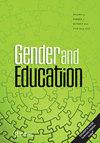切胡萝卜和成为“真正的”男人:乌兹别克男孩,家务劳动和后苏联乌兹别克斯坦男子气概的再生产
IF 1.9
3区 教育学
Q2 EDUCATION & EDUCATIONAL RESEARCH
引用次数: 0
摘要
摘要自1991年乌兹别克斯坦脱离苏联独立以来,民族主义话语被明显地男性化,继续影响着乌兹别克斯坦男性的日常生活。本文以乌兹别克斯坦的民族志田野调查为基础,阐述了乌兹别克斯坦男孩的家庭关系如何影响他们学习(重新)产生男子气概的方式,突出了高度的能动性和实用性。分析揭示了乌兹别克斯坦家庭(重新)生产乌兹别克斯坦童年作为非正式学习场所的三个核心主题:(1)通过家务劳动提供帮助;(二)表现出好客的社会性;(三)通过实践民族文化,使自己变得高尚。通过审视性别、教育和民族主义的交叉点,本文最后将乌兹别克人在国内的童年时代与在乌兹别克国家建设过程中培养男性霸权的民族主义运动联系起来。通过家庭生活——女权主义批评中一个有争议的概念——本文扩展了我们对传统女性化空间中童年(再)生产的理解。如果没有Jenny Munro博士和Garth Stahl教授的支持和帮助,这项工作是不可能完成的,他们对本文的初稿提供了许多有见地和建设性的意见。在此,我要衷心感谢编辑和审稿人的意见,感谢他们为我改进稿件所做的辛勤工作。我还要感谢Kate Leeson的编辑支持,她极大地提高了手稿的润色和清晰度。披露声明作者未报告潜在的利益冲突。本研究由昆士兰大学研究培训奖学金资助。作者简介赵阳,澳大利亚昆士兰大学社会科学学院人类学博士研究生。他的博士项目研究了乌兹别克斯坦首都塔什干(Tashkent)的年轻乌兹别克男性(主要是城乡移民)如何在伊斯兰复兴、民族主义和经济自由化等近期社会变革中,在社会期望和个人抱负之间游走。杨昭的研究与人类学在性别和种族不平等方面的研究密切相关,涉及性健康,特别是艾滋病毒/艾滋病。本文章由计算机程序翻译,如有差异,请以英文原文为准。
Chopping carrots and becoming ‘real’ men: Uzbek boys, household work and the reproduction of masculinities in post-Soviet Uzbekistan
ABSTRACTSince Uzbekistan gained independence from the Soviet Union in 1991, nationalist discourses have been overtly masculinized, continuing to inform Uzbek males’ daily lives. Drawing on ethnographic fieldwork in Uzbekistan, this article illustrates how Uzbek boys’ domestic relations contribute to the way they learn to (re)produce masculinities, foregrounding a high degree of agency and utility. The analysis uncovered three themes central to the (re)production of Uzbek boyhood in Uzbek families as a site of informal learning: (1) being helpful through domestic labour; (2) being social through showing hospitality; and (3) being tarbiyali through practising national culture. Through scrutinizing the intersections of gender, education and nationalism, this article concludes by connecting Uzbek boyhood in the domestic sphere and nationalist campaigns fostering masculine hegemony in Uzbekistan’s nation building process. Through domesticity – a contentious concept in feminist criticism – this article expands our understanding of the (re)production of boyhood in a conventionally feminized space.KEYWORDS: Boyhooddomestic masculinitieshousehold workinformal learninggendered nationalism AcknowledgementThis work would not have been possible without the support and help of Dr. Jenny Munro and Prof. Garth Stahl, who provided many insightful and constructive comments on the preliminary drafts of this article. I want to express my heartfelt thanks to the editors and reviewers for their thoughtful comments and hard work in helping improve the manuscript. I also would like to acknowledge Kate Leeson’s editorial support, which significantly enhanced the manuscript’s polish and clarity.Disclosure statementNo potential conflict of interest was reported by the author(s).Additional informationFundingThis work was supported by the University of Queensland Research Training Scholarship.Notes on contributorsYang ZhaoYang Zhao is a PhD candidate in anthropology in the School of Social Science at the University of Queensland, Australia. His doctoral project examines how young Uzbek men, mostly rural-urban migrants, navigate between social expectations and personal aspirations in Tashkent, the capital city of Uzbekistan amidst recent social change such as Islamic revival, ethnic nationalism and economic liberalization. Yang Zhao’s research is closely aligned with anthropology scholarship in gender and ethnic inequalities, with reference to sexual health, particularly HIV/AIDS.
求助全文
通过发布文献求助,成功后即可免费获取论文全文。
去求助
来源期刊

Gender and Education
EDUCATION & EDUCATIONAL RESEARCH-
CiteScore
5.20
自引率
9.10%
发文量
31
期刊介绍:
Gender and Education grew out of feminist politics and a social justice agenda and is committed to developing multi-disciplinary and critical discussions of gender and education. The journal is particularly interested in the place of gender in relation to other key differences and seeks to further feminist knowledge, philosophies, theory, action and debate. The Editors are actively committed to making the journal an interactive platform that includes global perspectives on education, gender and culture. Submissions to the journal should examine and theorize the interrelated experiences of gendered subjects including women, girls, men, boys, and gender-diverse individuals. Papers should consider how gender shapes and is shaped by other social, cultural, discursive, affective and material dimensions of difference. Gender and Education expects articles to engage in feminist debate, to draw upon a range of theoretical frameworks and to go beyond simple descriptions. Education is interpreted in a broad sense to cover both formal and informal aspects, including pre-school, primary, and secondary education; families and youth cultures inside and outside schools; adult, community, further and higher education; vocational education and training; media education; and parental education.
 求助内容:
求助内容: 应助结果提醒方式:
应助结果提醒方式:


